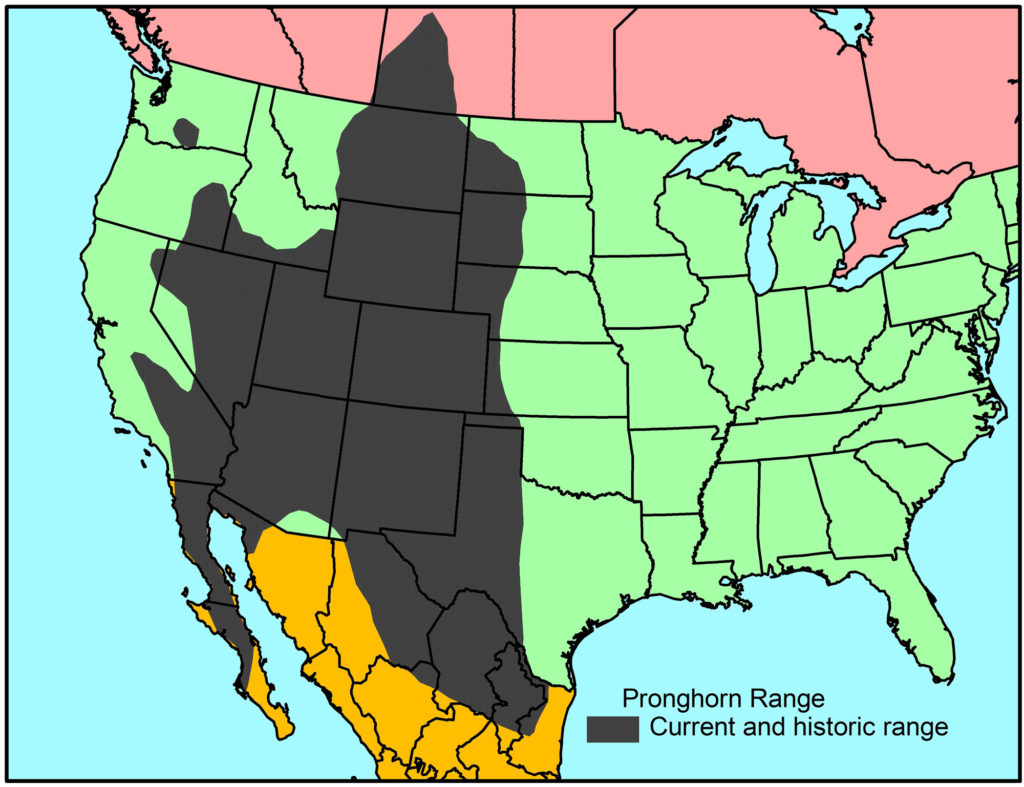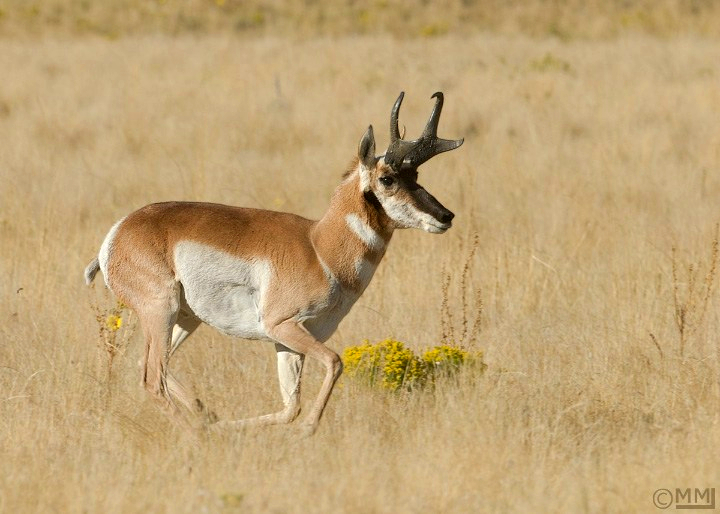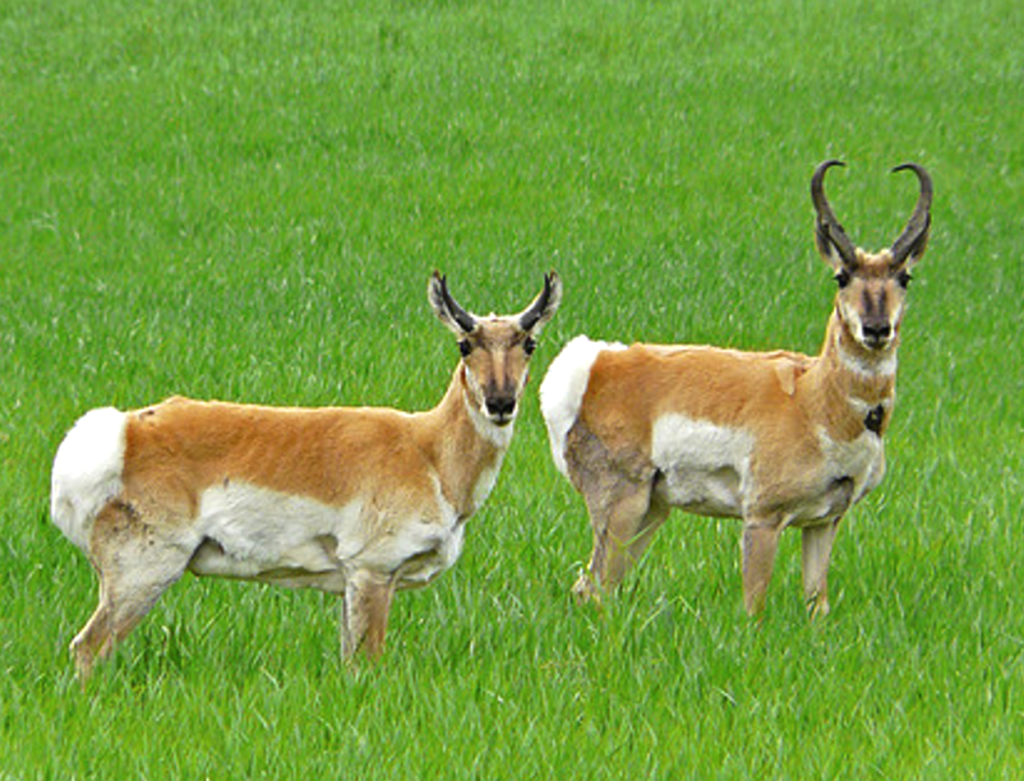Pronghorn (Antelope) Restoration – Get Involved
Antilocapra americana:
Many refer to it as an antelope but that is far from the truth. A true American native, the Pronghorn has sojourned across the deserts and plains of North America for at least a million years: but an antelope it is not. Its closest relative is the giraffe. [1]
Above photo from Focusing On Wildlife utilized in accordance with Fair Use.
Pronghorn Facts:
The fastest land animal in North America, pronghorns can run at speeds close to 60 miles per hour. Although pronghorns are not as fast as cheetahs, they maintain a fast speed for a longer period of time than cheetahs. [2]
Click to Enlarge:

Above map from Prairie Wildlife Research utilized respectfully according to Fair Use.
Population & Status:
Historically there were 35 million pronghorn in North America but overhunting drastically reduced their numbers down to 20,000 by 1924. Hunting and conservation groups were essential in helping agencies establish harvest limits and pronghorn populations rebounded. [3] Presently, they number around one million and the greatest numbers of them are in Wyoming and Montana. [4] Most states have a well regulated hunting season. One subspecies, the Sonoran pronghorn (Antilocapra americana sonoriensis) found along the Arizona-Mexico border, is listed as endangered under the Endangered Species Act. [3]
FEDERAL LEGAL STATUS – The entire peninsula pronghorn subspecies is listed as Endangered. The entire Sonoran pronghorn subspecies is listed as Endangered, except for some populations that are listed as Experimental, Non-Essential. [5]
Listed as Least Concern as the species remains widespread and relatively common within its range, with a population estimated at around one million animals. No major population declines are reported, with a number of populations occurring in large and well-managed protected areas. [6]
Restoration of Pronghorn:
The National Wildlife Federation and its affiliates are working hard to create wildlife corridors for pronghorns and other migratory wildlife and reduce conflicts between animals and people. [7]
Habitat
- open plains, fields, grasslands, brush, deserts and basins.
Range
- only found in North America.
- their natural range extended from southern Canada to northern Mexico.
- today, pronghorns are mainly found in the United States in the Great Plains, Wyoming, Montana, northeast California, southeast Oregon, Nevada, Utah, Colorado, Arizona and New Mexico.
- the highest numbers of pronghorn are in Wyoming in the Red Desert and Yellowstone ecosystems.
Migration
- the longest land migration in the continental U.S. The only other land animal to travel farther in North America is the (Canadian) caribou.
- Between the summer and winter, pronghorns migrate between feeding grounds to survive the harsh winter.
- in November, as the snow starts falling in Wyoming, they begin migrating in small herds south from Grand Teton National Park across government land, private lands and ranches. For 3 days (150 miles), the herd is on the move and sometimes the pronghorns have to travel under fences and near roads. If they make it to the Upper Green River Valley, then the pronghorns will make the journey back north to greener pastures in April. Several herds with about 400 pronghorns, make the 300 mile roundtrip journey.
- The trip requires crossing private property and fences. In the past, pronghorns had to worry about predators and cold weather. Today, the bigger threats are cars, impassable fences and development.
Life History and Reproduction
- breed in late summer or fall depending on their location – those in the southern part of the range tend to breed earlier.
- Males breed with multiple females within their territories, which they defend against other males. Fighting between males can become very heated with aggressive movements and even physical combat. Some pronghorns can be seriously injured during these battles.
- females are pregnant throughout the winter and they give birth in the spring, having either 1 or 2 fawns.
Size
- ~4 ½ feet long, 3 feet tall and weigh between 90-150 pounds depending on the sex. Females weigh less.
Diet
- grasses, forbs, sagebrush and other prairie plants.
- after they swallow food, it passes through the stomach and then the pronghorn regurgitates it. The regurgitated food is called cud. This process allows the pronghorn to break the plant material into smaller pieces so that more nutrients are absorbed.
- they seldom drink water, because they receive most of their water from the plants they eat.
Typical Lifespan
- average lifespan of around 10 years. [2]
Above photo from The Ark in Space utilized respectfully in accordance with Fair Use.
References:
[1]: The Ark in Space, “The Pronghorn – The American Almost Antelope” (10-16-2011): www.arkinspace.com/2011/10/pronghorn-american-almost-antelope.html
[2]: Defenders of Wildlife, “Basic Facts About Mountain Goats”: www.defenders.org/mountain-goat/basic-facts
[3]: Prairie Wildlife Research, “Pronghorn”: www.prairiewildlife.org/pronghorn.html
[4]: Great Plains Nature Center, “Pronghorn”: http://www.gpnc.org/pronghor.htm
[5]: U.S. National Forest Service, “Index of Species Information”: www.fs.fed.us/database/feis/animals/mammal/anam/all.html CITED ON PAGE: U.S. Department of the Interior, Fish and Wildlife Service. 2016. Endangered Species Program: www.fws.gov/endangered/. [86564]
[6]: The International Union for Conservation of Nature (IUCN) Global Species Programme Red List Unit, “Antilocapra americana”: www.iucnredlist.org/details/1677/0
[7]:National Wildlife Federation, “Pronghorn”: www.nwf.org/Wildlife/Wildlife-Library/Mammals/Pronghorn.aspx


